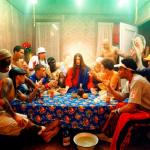Pop Christianity
Our readings this week consist of several writings examining the topics of popular culture, technology, media, theology, and religion. One aspect I found intriguing was the study of how popular culture affects religion, and specifically Christianity in the United States. Forbes and Mahan, in their book Religion and Popular Culture in America ask the following question, “When churches adopt ‘the strategies and techniques of modern marketing’ from the business World, and ‘the audience becomes a market and the gospel is transformed into a product,’ should religious people view these influences as effective adaptation or a threatening transformation?” (13) Religions must be adaptable in order to engage the unique personality and culture of each generation. But when is the transformation dangerous to the health of the religion itself and to its believers and the rest of the world? Can the purity of the religion be tainted by popular culture? Let’s look at Christianity and its possible adaptations in the U.S. Are these transformations helpful or hurtful? How have the concepts of individualism, competition and materialism affected Christianity? One might argue that the communal aspect of Jesus’ ministry, with his disciples and followers has become a field of competition where individualism reins and where prophets, bishops, apostles, pastorpreneurs, etc. market their brand of the gospel. And who doesn’t want to write a great book, go on a book tour, share his/her corner on the gospel message? Is that so terrible? Some of these individuals have their own TV shows, internet shows, product lines, and followers. Are they doing their part to share the gospel or are they commodifying the gospel? Is it ok to do both? Jesus travelled with a group of disciples who shared food and lodging. They became a tight-knit community that broke bread together and ministered together. Is this a viable way of living today in the U.S.? Many churches have developed communities and small groups in order to engage in this type of experience resulting in wonderful relationships between believers and non-believers. Typically, these groups disband with the individuals going to their own homes and lives after events are over. So, at what point does individualism become negative? Is it when competition develops? How and when did the gospel become a competition? When did it change from “good news” for all to an exclusive way to “streets of gold?” How much competition has bled into Christianity becoming part of its DNA? The competition is not just between Christianity and other belief systems but also within Christianity itself. One denomination has a curb on the Truth while another is a little “off” in their theology. Denominations and churches have split over competitive ideas regarding theology. Can this be seen as healthy competition with a final goal of the ultimate Truth; or is this an indulgent exercise in a hunger for resources and power? When does competition become a bad thing in Christianity? Resources are necessary to sustain a community, but when does resourcing become materialism? Unlike animals who hunt, eat and are satisfied, humans have an unquenchable thirst that is never satisfied. This results in consumption of material things that are not necessary for survival but oh so shiny and sweet – gold, diamonds and sugar, to name a few. From the historical corridors of Christianity we see sparkles of materialism; in the gorgeous cathedrals and art to the lavish lifestyles of popes and preachers. And yet, how many Christians actually give away all of their possessions and follow Jesus? How, in modern society, would one even do such a thing? Is there a line that can be drawn for every individual across which he/she should not cross into materialism? Even Jesus defended the woman who poured expensive perfume on his feet. Dear reader, you can see I have more questions than answers. But perhaps this writing will begin conversations that will help in finding the necessary adaptations and help weed out the dangerous transformations of Christianity.

Leave a Reply
You must be logged in to post a comment.